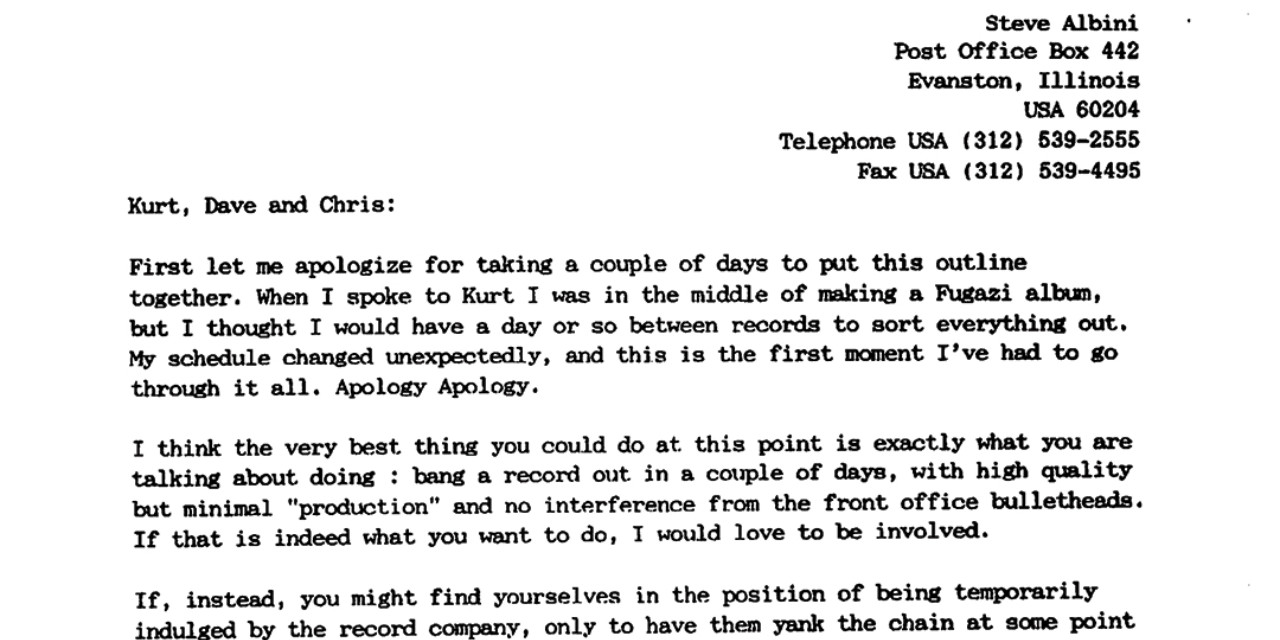Nirvana hat das mit 61 viel zu frühe Ableben des Musikers und Produzenten Steve Albini zum Anlass genommen, einen alten Brief zu veröffentlichen. Albini produzierte damals Nirvanas „In Utero“ Album und dieses Schreiben spiegelt gut seine Philosophie wieder – und möchte man gern an die Wände von Aufnahmestudions weltweit nageln. Kein Wunder, dass der berüchtigt kommerzscheue Kurt Cobain in Albini einen Seelenverwandten gesehen hat, jemand mit dem er nach dem Mega-Erfolg von „Nevermind“ eine Platte aufnehmen konnte, die nach seinem Willen klang und nicht von Plattenfirma-Dudes weichgespült wurde. Der Brief ist in seiner Gänze lesenswert, aber für die Nichtfacebookler hier einige der besten Stellen exzerpiert:
„I think the very best thing you could do at this point is exactly what you are talking about doing: bang a record out in a couple of days, with high quality but minimal “production” and no interference from the front office bulletheads. If that is indeed what you want to do, I would love to be involved.
If, instead, you might find yourselves in the position of being temporarily indulged by the record company, only to have them yank the chain at some point (hassling you to rework songs/sequences/production, calling-in hired guns to “sweeten” your record, turning the whole thing over to some remix jockey, whatever…) then you’re in for a bummer and I want no part of it. (…)
I have worked on hundreds of records (some great, some good, some horrible, a lot in the courtyard), and I have seen a direct correlation between the quality of the end result and the mood of the band throughout the process. If the record takes a long time, and everyone gets bummed and scrutinizes every step, then the recordings bear little resemblance to the live band, and the end result is seldom flattering. Making punk records is definitely a case where more “work” does not imply a better end result. Clearly you have learned this yourselves and appreciate the logic. (…)
I like to leave room for accidents or chaos. Making a seamless record, where every note and syllable is in place and every bass drum is identical, is no trick. Any idiot with the patience and the budget to allow such foolishness can do it. I prefer to work on records that aspire to greater things, like originality, personality and enthusiasm. If every element of the music and dynamics of a band is controlled by click tracks, computers, automated mixes, gates, samplers and sequencers, then the record may not be incompetent, but it certainly won’t be exceptional. (…)
I do not consider recording and mixing to be unrelated tasks which can be performed by specialists with no continuous involvement. 99 percent of the sound of a record should be established while the basic take is recorded. Your experiences are specific to your records; but in my experience, remixing has never solved any problems that actually existed, only imaginary ones. I do not like remixing other engineer’s recordings, and I do not like recording things for somebody else to remix. I have never been satisfied with either version of that methodology. Remixing is for talentless pussies who don’t know how to tune a drum or point a microphone.(…)
I do not want and will not take a royalty on any record I record. No points. Period. I think paying a royalty to a producer or engineer is ethically indefensible. The band write the songs. The band play the music. It’s the band’s fans who buy the records. The band is responsible for whether it’s a great record or a horrible record. Royalties belong to the band.
I would like to be paid like a plumber: I do the job and you pay me what it’s worth. The record company will expect me to ask for a point or a point and a half. If we assume three million sales, that works out to 400,000 dollars or so. There’s no fucking way I would ever take that much money. I wouldn’t be able to sleep. (…)
I have to be comfortable with the amount of money you pay me, but it’s your money, and I insist that you be comfortable with it as well. Kurt suggested paying me a chunk which I would consider full payment, and then if you really thought I deserved more, paying me another chunk after you’d had a chance to live with the album for a while. That would be fine, but probably more organizational trouble than it’s worth.
Whatever. I trust you guys to be fair to me and I know you must be familiar with what a regular industry goon would want. I will let you make the final decision about what I’m going to be paid. How much you choose to pay me will not affect my enthusiasm for the record. (…)
If a record takes more than a week to make, somebody’s fucking up. Oi!”




Top, danke!